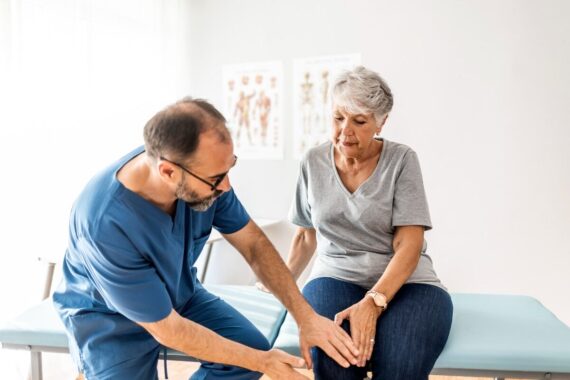NICE recommends adapted shoes for severe osteoarthritis

Adapted shoes could be prescribed to patients with severe osteoarthritis in order to reduce pain, NICE has recommended in new draft medical technology guidance.
Patients eligible for total knee replacement surgery could use shoes developed by AposHealth, which help to correct abnormal walking patterns, re-educate muscles and improve biomechanics for patients.
NICE’s medical technology committee recommends Apos footwear for patients who are unable or unwilling to have surgery, amid clinical evidence indicating they improve pain, stiffness, and function scores.
The shoes could save the NHS £1,958 per person when compared with standard non-surgical care over five years, the committee’s analysis showed.
NICE said that the footwear and associated treatment from trained professionals are estimated to cost £875 per person, which turns out to be much cheaper than currently available solutions.
At the moment, treatments offered to people with knee osteoarthritis include walking sticks; therapeutic exercise, such as local muscle strengthening and general aerobic fitness; and weight loss, if appropriate.
Apos footwear looks like a trainer and is fitted with rubber ‘pods’ on the soles, which are positioned by a trained healthcare professional to ensure that shoes are adapted to the individual requirements to redistribute pressure away from affected areas.
The consultation on the draft medical technology guidance (MTG) closes on Monday 12 December.
MTGs are aimed at helping the NHS make ‘efficient, cost-effective and consistent decisions about adopting new medical technologies’. However they do not include a funding mandate and it is up to local commissioners to decide whether to implement recommendations.
NICE interim director of medical technology Mark Chapman said: ‘People with osteoarthritis of the knee can be in considerable pain going about their day-to-day lives and the evidence seen by our committee suggests this can be improved by wearing these shoes.
‘This recommendation will not only save the NHS money by balancing the best care with value for money, but it will also put a new innovation into the hands of health and care professionals to enable best practice.’
The National Joint Registry shows that osteoarthritis is the most common type of arthritis in the UK. An estimated one in five people aged over 45 suffer from knee osteoarthritis in England, with 38,983 knee procedures taking place last year.
Policies to limit access to knee replacement surgery on the basis of BMI have led to a decrease in knee replacement operations and may be contributing to health inequalities, according to a recent study.
Currently around 70% of CCGs restrict access to joint replacement based on weight in some form but policies vary from denying referral to an operation until a patient’s BMI is below a certain threshold and others having no restrictions.
Visit Pulse Reference for details on 140 symptoms, including easily searchable symptoms and categories, offering you a free platform to check symptoms and receive potential diagnoses during consultations.









